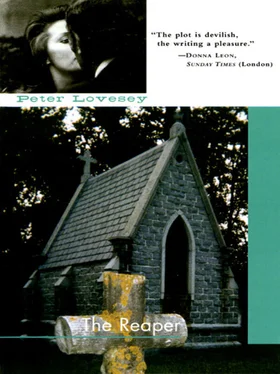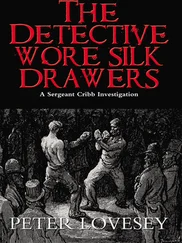Peter Lovesey - The Reaper
Здесь есть возможность читать онлайн «Peter Lovesey - The Reaper» весь текст электронной книги совершенно бесплатно (целиком полную версию без сокращений). В некоторых случаях можно слушать аудио, скачать через торрент в формате fb2 и присутствует краткое содержание. Жанр: Криминальный детектив, на английском языке. Описание произведения, (предисловие) а так же отзывы посетителей доступны на портале библиотеки ЛибКат.
- Название:The Reaper
- Автор:
- Жанр:
- Год:неизвестен
- ISBN:нет данных
- Рейтинг книги:5 / 5. Голосов: 1
-
Избранное:Добавить в избранное
- Отзывы:
-
Ваша оценка:
- 100
- 1
- 2
- 3
- 4
- 5
The Reaper: краткое содержание, описание и аннотация
Предлагаем к чтению аннотацию, описание, краткое содержание или предисловие (зависит от того, что написал сам автор книги «The Reaper»). Если вы не нашли необходимую информацию о книге — напишите в комментариях, мы постараемся отыскать её.
The Reaper — читать онлайн бесплатно полную книгу (весь текст) целиком
Ниже представлен текст книги, разбитый по страницам. Система сохранения места последней прочитанной страницы, позволяет с удобством читать онлайн бесплатно книгу «The Reaper», без необходимости каждый раз заново искать на чём Вы остановились. Поставьте закладку, и сможете в любой момент перейти на страницу, на которой закончили чтение.
Интервал:
Закладка:
Those words acted like a blessing. Stanley left the rectory in a glow of self-esteem, firmly resolved to continue as treasurer for at least another year. The more he saw of this young rector, the more he liked him.
Otis Joy, too, was quietly satisfied. He had been fortunate with treasurers at the two churches he had served as priest. Retired men, both of them, committed Christians, anxious to co-operate fully in the mundane business of financing church activities. How can a rector effectively carry out God's work if he is worried over money?
Take the matter of expenses. No priest wants to be a charge on the parish. Treasurers always feel embarrassment at being asked by the rector for petty cash. He is their minister, their spiritual father, so it can be uncomfortable dealing with his claims for car and public transport expenses, telephone, postage, stationery, secretarial assistance, office equipment, maintenance of robes, fees for visiting clergy and-a major item for an active priest-hospitality at the rectory. Fortunately his main income, his stipend, is not the business of the parish treasurer.
Otis Joy's solution to the thorny subject of expenses was the contingency fund, a building society account entirely at the disposal of the rector. It was fed by injections of cash. A church takes in most of its income in the form of cash. Collections at services are the prime source, but each fund-raising event brings in packets of coins and notes: fetes, coffee mornings, jumble sales, choral concerts, safari suppers, skittles, barbecues and social evenings. There are boxes in church for visitors to contribute a few pence to the upkeep, to buy candles, postcards and guide-sheets. Cash, cash, cash. Everything is bagged up and counted, but there are always late payments, niggling amounts that add to the work of the treasurer. The remedy was to siphon all the extras-with the treasurer's connivance-into the rector's contingency fund. This money didn't go through the books, so it simplified the accounting. More importantly, it reduced the total amount showing as parish income, and discouraged the DBF from increasing the quota.
Weddings, baptisms and funerals were another source of funds. The parochial fees were displayed on the board in the church porch, and it was convenient (the rector always explained to the families) to have them paid in banknotes, rather than cheques. He received the money in person, on the day, and paid the organist, bell-ringers and choir. The residue was his personal fee and that of the parish church council. It went into the contingency fund.
In return, he didn't pester the treasurer with frequent requests for petty cash. They had an understanding that he would draw a token amount, a nice, round figure-enough to keep the accounting simple, satisfy the auditors and everyone at the Annual General Meeting.
A happy arrangement for all concerned.
Later in the week at a confirmation class held in his office at the rectory, someone asked him about hell.
The question came from one of the adult candidates, a ginger-haired chartered accountant with freckles and a dour expression whose only charm was his name, which sounded like a seaside resort. Burton Sands had come late to the faith, but he was not a typical born-again Christian. He had chosen the Church of England after carefully investigating its claims and obligations. He'd picked it as a superior form of unit trust, a low-risk investment that might pay decent dividends in the long term.
"Hell?" said Otis Joy, as if it were a foreign word.
"Yes."
"We give it a low profile. It's a concept we're not too comfortable with in the modern church, but I'll say this"-he smiled and tried to duck out with a quip-"you won't find it in the travel brochures."
"Yes, but do you believe in it?" Sands pressed him.
John Neary, a plain-speaking countryman, said, "It's where you go if you arse about, isn't it?"
Ann Porter, the only woman in the group, sanitised the remark with, "If you err and stray like lost sheep."
"We all do, of course," the rector admitted. "The Bible tells us that all have sinned and come short of the glory of God, so-"
"See you down there, Rector," said Neary.
Everyone except Sands smiled, and the atmosphere improved. In some ways Neary was the saving of this group, the opposite pole to Sands. He watched football, and fiddled with his car and kept a few beehives in the back garden.
Joy tried to strike a more positive note. "Happily, there's redemption. When you're confirmed, you repent of your sins and renounce evil."
"So will I go to hell if I'm not confirmed?" Sands asked.
"Snap out of it, Burton. Be positive. Lead the Christian life and you may enter the Kingdom of Heaven."
"But if we don't," persisted Sands with his interest in the other side of the balance sheet, "if we sin and break the Ten Commandments and forget to say our prayers, what then?"
Neary yawned and said, "Let's face it. It's impossible to keep the Ten Commandments. Everyone breaks the old thou shalt nots."
"All of them?" chipped in Ann Porter. "Speak for yourself."
"No, I'd rather hear it from you, love," Neary was quick to respond. "You must have broken some. Which ones?"
She reddened. "I'm not going into that."
There were children of twelve and thirteen in the class, looking interested. "We don't have to make this personal," the rector cautioned.
"What she means," Neary continued to bait Ann Porter, "is that she has a clean sheet on number six. She hasn't murdered anyone."
"Not yet-but I might, and soon," murmured Ann.
"I guess we're all in the clear when it comes to that one," Neary blithely carried on. "Murder, I mean."
There was a pause.
"Well, don't all shout at once," said Neary.
"I'm still waiting for someone to answer my question," said Sands like a dog with a bone. "What exactly is hell?"
All eyes were on the rector, who for his own reasons had gone quiet. It was Neary who offered a partial reply. "The Bible talks about hell fire, so we know it's hot."
"Oh yes?" said Ann Porter, glad of the chance to get back at him. "With little red demons prodding you with tridents?"
Otis Joy made a serious effort to get back on track. "It may not be the same for everyone. We may all have our personal hells."
"Like a Barry Manilow concert?" said Neary.
"For all eternity," said Ann.
"Do you have to reduce everything to a joke?" said Sands. "You talk about personal hells, Rector. What's yours?"
"Mine?" Joy blinked, startled to be asked. Confirmation classes were not his favourite duty. You could bank on getting some bumptious candidate like this one, wanting to challenge theology. "Losing my job is the worst thing I can possibly imagine."
"But that happens all the time, people being made redundant."
"Not to the clergy," said Neary. "That's a job for life. It's even called a living, isn't it, Rector?"
There was a day in the week, generally Tuesday, when Joy was free of parish duties. He arranged his diary to preserve that one clear spot, and got in his ancient car and drove out of the village early in the morning and was not seen all day. The lights in the rectory did not come on until late. He never spoke of what he did, and nobody had the cheek to ask.
Theories abounded, however. It was put about at first that he was a betting man and went to the races. Later, that he bought and sold antiques, or books, or postage stamps. There was a strong rumour that he visited a mentally handicapped brother in a residential home in Bath. Another, more earthy, that he had a mistress, a married woman living on the south coast.
Stanley Burrows said, "What does it matter as long as he carries out his duties here? It's none of our business. He doesn't demand to know how we spend every minute, so what right have we to poke our noses into his private life?"
Читать дальшеИнтервал:
Закладка:
Похожие книги на «The Reaper»
Представляем Вашему вниманию похожие книги на «The Reaper» списком для выбора. Мы отобрали схожую по названию и смыслу литературу в надежде предоставить читателям больше вариантов отыскать новые, интересные, ещё непрочитанные произведения.
Обсуждение, отзывы о книге «The Reaper» и просто собственные мнения читателей. Оставьте ваши комментарии, напишите, что Вы думаете о произведении, его смысле или главных героях. Укажите что конкретно понравилось, а что нет, и почему Вы так считаете.












